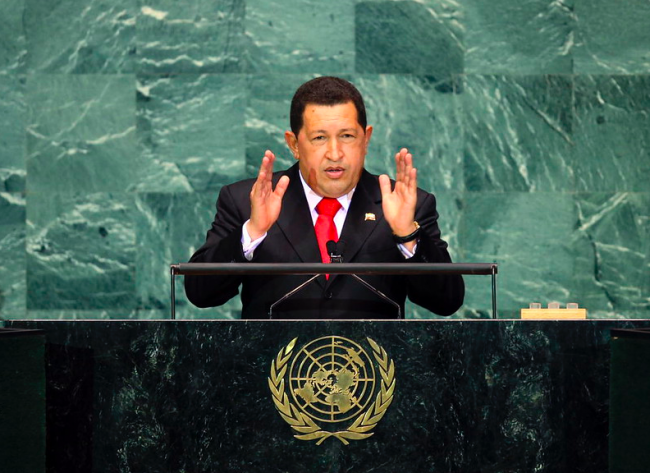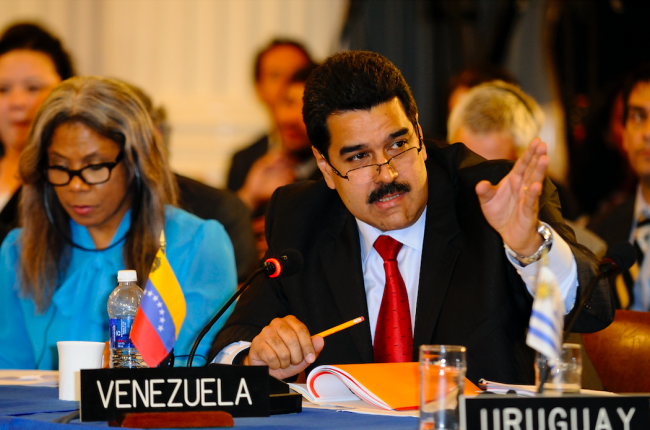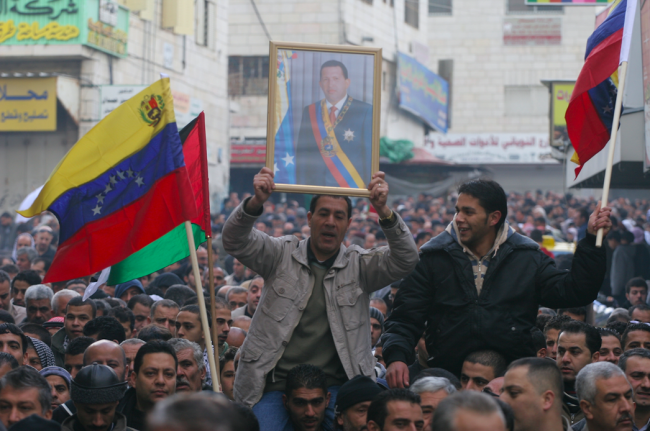
A version of this piece was originally published in the Spring 2022 issue of the NACLA Report. Subscribe in print today!
Leer este artículo en español.
Hugo Chávez’s presidency brought about a strategic change in Venezuelan foreign policy. In this conversation, former Venezuelan diplomats Angelo Rivero Santos and Juan Antonio Hernández reflect on the impact of the April 11, 2002 coup on the evolution of foreign policy in Venezuela. Between 2006 and 2013, Rivero Santos served as minister counselor for politics and economics and as deputy chief of mission at the Embassy of the Bolivarian Republic of Venezuela in Washington, DC. For half of his time in service, he was designated by the Chávez administration as charge d’affaires ad interim to the White House. Between 2009 and 2018, Hernández was the Venezuelan ambassador to Qatar, Egypt, and the Arab League. This conversation, held on Zoom, has been edited for length and clarity.
Angelo Rivero Santos: What is your take on the evolution of Venezuelan foreign policy since April 2002?
Juan Antonio Hernández: A positive aspect is that Chávez put emphasis on creating regional mechanisms in South America, Latin America, and the Americas in general. These initiatives gained important momentum. But the damage that the coup did to relations with the United States could never be overcome. In the last 20 years, the bilateral relationship has deteriorated to the point that it no longer exists. It’s also important to look at the factors surrounding this relationship that distort perspectives. I think that, in the United States, there clearly is an internal agenda that gives more importance to electoral results in south Florida.
Regarding April 11, 2002, the clear participation of the United States in the coup, together with the entire neoconservative ideology of U.S. foreign policy and the events in Iraq and Afghanistan, strongly impacted Chávez’s strategic vision, which was already very anchored in historical Bolivarianism and creating a regional alliance to serve as a counterweight to Washington. Earlier, I think that there was a moment in bilateral relations that presented a more pragmatic vision of greater proximity—for instance, when John Maisto was U.S. ambassador in Caracas from 1997 to 2000. That idea disappeared. The situation became polarized and radicalized.
For Chavismo, clearly, there wasn’t much to do after President George W. Bush recognized interim president Pedro Carmona Estanga and after the United States participated in the planning that led to the coup and the oil strike. There was not much left to salvage in the relationship with that government. What possibility emerged with Barack Obama was soon lost. I believe that the various conservative lobbies that influence U.S. foreign policy ended up imposing their agenda on the Obama administration. And, of course, then came four years of Trump, which, representing a very radical sector of the U.S. Republican Party, destroyed any possibility of dialogue. Biden represents a new possibility.
ARS: I completely agree. The impact of the attempt to overthrow Chávez was huge. For three years, Chávez had attempted to work toward normal relations with the United States. Then, a few days after the coup, on Saturday, April 13, 2002, the press secretary of Bush’s White House, Ari Fleischer, blamed Chávez. This was a huge contradiction given that foreign policy since Bill Clinton’s administration had been based on “democracy promotion.” Chávez’s foreign policy strategy in the hemisphere had a lot to do with this.
After the coup and the oil strike, it was clear that there were national and transnational forces that wanted to oust Chávez. From my perspective as an internationalist, it was a clear attempt by the United States to protect the “hegemonic stability” of the liberal international system in the hemisphere. The Venezuelan process and Chávez’s leadership were key in challenging this hegemony and promoting different models for society and integration—what’s now known in the literature as post-hegemonic regionalism. The integration that Chávez proposed was based on a political logic and not on the neoliberal economic logic. Chávez was a lone ranger until leaders like Lula da Silva, Evo Morales, and Rafael Correa came along.
JAH: Exactly. And for that reason, in the eyes of a radical sector of Bush’s Republican Party, Chávez became a sort of symbol that had to be destroyed.
ARS: And Venezuela became the country that led many of these processes and was the target of the attacks. And then, after the invasions of Iraq and Afghanistan following September 11, 2001, we saw the “securitization” of U.S. foreign policy. This shift had a big impact, and we saw the rise of forces in Latin America that began to use this same strategy to “securitize” their internal problems.
JAH: I’m thinking about the case of Álvaro Uribe in Colombia. Now, at what point does all this about Bush and the Venezuelan neoconservatives become a sort of self-fulfilling prophecy? The PSUV emerged in 2007. As a university student in the 1990s, I participated in the Bolivarian movement and everything that followed the 2002 coup. In those years, what dominated was a large, ideologically diverse alliance oriented around patriotic, nationalist, and Latin American ideas. And the most radicalized part of the Left—socialism, a vision connected with the Soviet model in Cuba—remained in the background. But it intensified after 2002. So I ask if this isn’t a sort of self-fulfilling prophecy—the product of pushing against each other until the other side radicalizes. It’s a perverse mechanism that must be dismantled.
ARS: That has been a constant in U.S. foreign policy, regardless of the party in power: extreme pressure. That was the policy under Bush, under Obama, and under Trump. The United States has seen all these processes as a threat to its aspirations for ideological hegemony—let along military—over the continent. Elections in Latin America throughout this century didn’t give Washington the results it had hoped for after attempting to create a neoliberal order. They see what has happened in countries like Venezuela not as a challenge to ideas but as a threat.
JAH: Or a possibility.
ARS: Exactly. Washington falls into these self-fulfilling prophecies. They tend to respond more to internal interests, which lead them to committing foreign policy errors that, in my opinion, end up affecting their own interests in the region.
JAH: Absolutely. It’s interesting. They inflict damage on themselves through this ideologized vision. Which is curious because if there’s something that characterizes liberalism, it’s a kind of de-ideologizing.

ARS: We can see how Washington’s inability to correct some of its actions is, in part, due to the fact that information used in lobbying comes from Latin American elites that really speak Washington’s language. They know how the system works. I always turn to the example of Iraq. Ahead of the invasion of Iraq, a man named Ahmed Chalabi came to Washington and convinced Dick Cheney that the U.S. would be received as a liberator. The Latin American elites tend to sell a Latin American reality that may be partially true, but it isn’t the reality of transformation processes undertaken in countries like Venezuela, Bolivia, Nicaragua, Mexico, and Argentina. There is a lack of social and political understanding of the region. Their foreign policy hasn’t been strategic; it responds to crisis, and lately it is obsessed with China’s influence. Before the obsession was with terrorism, now it’s with China’s influence.
JAH: China’s nd Russia’s. It’s curious that the Atlantic Council created the Venezuela Working Group, led by an expert in the Russian military sector. I understand that they want to know what is happening with the North Americans, but from a comprehensive point of view, we shouldn’t get involved in these military issues. It seems warped to me—an attempt to lump things into the security and defense umbrella.
ARS: In the Venezuelan case, unfortunately, the debate that existed until 2012 has been lost. It was a really interesting debate about Venezuela and the region and the causes behind these changes. The Biden administration faces the great challenge of having a coherent foreign policy with respect to the region. Because clearly, after what happened in 2002 in Venezuela and the last 20 years of the region’s experiences with the United States, the real challenge for Washington is understanding these processes of change and not seeing them as a threat.
JAH: Based on my training as a Latin Americanist, it occurs to me that there are two explanatory models that can be applied to Venezuela—two models for approaching relations between the United States and Latin American governments with different political alignments. One is obviously the Cuban government. The lenses that are used to look at Venezuela have a lot to do with the Cuba approach, and in Venezuela we’re also implicated in the impasse with the United States created after 1959. But the other model for looking at Venezuela would be that of Argentina and Juan Perón. You can see a significant polarization with the Perón of the 1950s, framed as a choice between Perón and the United States. And then, after the return of democracy in Argentina, we saw the United States handle a Peronist as a normal and socially legitimate political force. I think that is the key with respect to Chavismo. The United States can’t keep thinking that it has to get rid of Chavismo the way it gets rid of a terrorist or a criminal.
ARS: I agree. But I think that this has also involved the efforts of many political actors in the region—attempts to eradicate progressive movements that promote different ideas not just for society but for the hemisphere. A great many Latin American political leaders have played this game. The Lima Group was an expression of that, as was Uribe’s foreign policy, as these were based on efforts to halt Chavismo and the influence of Venezuela, Bolivia, and other nations in South America and the hemisphere. The worst kept secret of the U.S. Congress between 2005 and 2009 was that one of the arguments that Uribe used to achieve his free trade agreement was the need to stop Bolivarianism. That’s not to mention the military intensification that came with Uribe securitizing Colombian foreign policy and all the consequences that followed.
JAH: Look at the danger in that. That militarized foreign relations policy ended up being a big business in creating interested groups that would not benefit from normalized relations with Venezuela. Because they built their businesses on this idea of polarity.
ARS: Absolutely. Let’s move outside the continent. What was the impact of the 2002 coup on Venezuelan foreign relations with the Middle East?
JAH: We know that once Chávez rose to power, he made efforts to strengthen OPEC, which was very battered and diminished at the time. There are emblematic photos of him driving in a car with Saddam Hussein at his side and that kind of thing. He also promoted initiatives like the Gas Exporting Countries Forum in Qatar. Chávez had a big impact in this region because didn’t only speak with the elites, but also with common people. He always made an effort to be in touch with people on the street—students, street vendors, taxi drivers, whoever he could find. There was this view of Chávez as a sort of Gamal Nasser, a really important figure who represented the possibility of a united Arab nation based on secular values. Chávez connected really strongly with this.
I arrived in the Middle East in 2009, which was an important moment because Chávez’s anti-imperialist positions really affected Arab public opinion, including via Al Jazeera. Chávez really capitalized on that through condemnation. Of course, as relations with the United States deteriorated, Chávez started looking for other ways of capitalizing on oil. And that was the start of many important projects like the Summit of South American-Arab Countries (ASPA). This had momentum with several heads of state at the time, including Chávez, Lula, Kirchner, the emir of Qatar, and different Arab leaders. It was an interesting time. I was at several of these summits. It wasn’t just focused on oil and energy; there were also cultural projects. I think there was also the possibility of creating investment projects in the Venezuelan gas sector. And that was undermined in part by the dynamics in the Middle East. But Chávez remained an important symbol in the Arab world. He managed to connect with the political current of the Arab world that Nasser had embodied in the past.

ARS: Let’s talk about Venezuelan foreign policy through PetroCaribe. The United States attempted, including under the Obama administration, to pressure Caribbean nations to not participate in PetroCaribe. The program even extended to the United States with the heating oil program via CITGO, PDVSA’s subsidiary at the time. While it existed, that program provided discounted heating oil for more than 2 million families, more than 240 Indigenous communities, and more than 270 homeless shelters.
JAH: Those programs were quickly forgotten.
ARS: The memory around those programs is very short. It seems nobody remembers any of it. But that oil vision and CITGO program had a big impact. What are the lessons that we can learn from these experiences? As a leading South American nation, what have we learned in terms of the evolution of foreign policy? I ask myself these questions a lot.
JAH: With Chávez, Venezuela became aware that it is a geopolitically important country in Latin America. It bridges the Caribbean, the Amazon, and the Andean world. What Venezuela does impacts the whole region. Chávez deserves historic credit for having reactivated that. Because in reality this has always been the case, but Chávez brought it back to the forefront. At the same time, from a more critical point of view, I think that there was a strong voluntarism deeply rooted in Chávez’s personality that often overstated his own political will. That will didn’t always take into account the pettiness and the specific interests at play in many places.
That voluntarism often conflicted with the national and regional reality. Since then, a more sober foreign policy has been in place, one more linked perhaps to Latin American regional issues, and to reshaping relations with the United States. That is essentially what I foresee in the future. Clearly, we are in a kind of global interregnum. The global dispute over hegemony has not resolved itself nor will it be resolved for decades. The predictions that China will displace the United States or that the United States will go to war with China need to be put into perspective. There is still a historical time lapse that allows us to think of Venezuelan foreign policy as a policy that must try to balance different global powers.
ARS: I agree. And that requires not just leadership but also knowledge.
JAH: Yes. The other aspect is that the Venezuelan foreign service has to change.
ARS: Definitely. To face today’s challenges, we need a foreign service that builds on what we have, but that can also confront the challenges of the 21st century. These challenges aren’t the same as they were in the 1990s, or even in the first two decades of this century. And we have to develop the capacity to adapt to this reality.
JAH: Yes. Because there is a great acceleration of historical time. I think that our foreign service is overextended. There are tons of embassies—we need to find a way to consolidate them. Attempting to maintain relations with many countries that don’t have embassies in Venezuela doesn’t make much sense. Resources could be redistributed to embassies in countries with significant regional influence and that have embassies in Caracas, which is what most countries do.
And regarding internal training, I think that there needs to be an effort to re-professionalize the foreign service. In what way? There should not be diplomats outside Latin America who don’t speak any language other than Spanish. I say that without undervaluing anyone because there are well-trained diplomats. But this core group, which certainly includes the current foreign minister, Félix Plascencia, is a minority in the foreign service. I think that we need to raise the level of the average diplomat and try to standardize the training that all foreign service members receive, at least in terms of general knowledge. I think we have to prioritize regional knowledge, language, and cultural knowledge. Possession of supposed political and ideological “clarity” can’t be an excuse for not having solid training in languages, cultures, and regions.
ARS: Exactly. And that would allow diplomats to develop cognitive abilities to understand others in their own environment. And that is essential.
Angelo Rivero Santos is currently teaching associate professor and director of Academic Affairs at the Center for Latin American Studies, Georgetown University. He previously served as a Venezuelan diplomat from 2006 to 2013.
Juan Antonio Hernández is an academic, novelist, and diplomat. He has been a professor at the University of Kentucky, Cornell, and the Universidad Simón Bolivar in Venezuela. He was the Venezuelan ambassador to Qatar, Egypt, and the Arab League between 2009 and 2018.
Translated from Spanish by NACLA.

